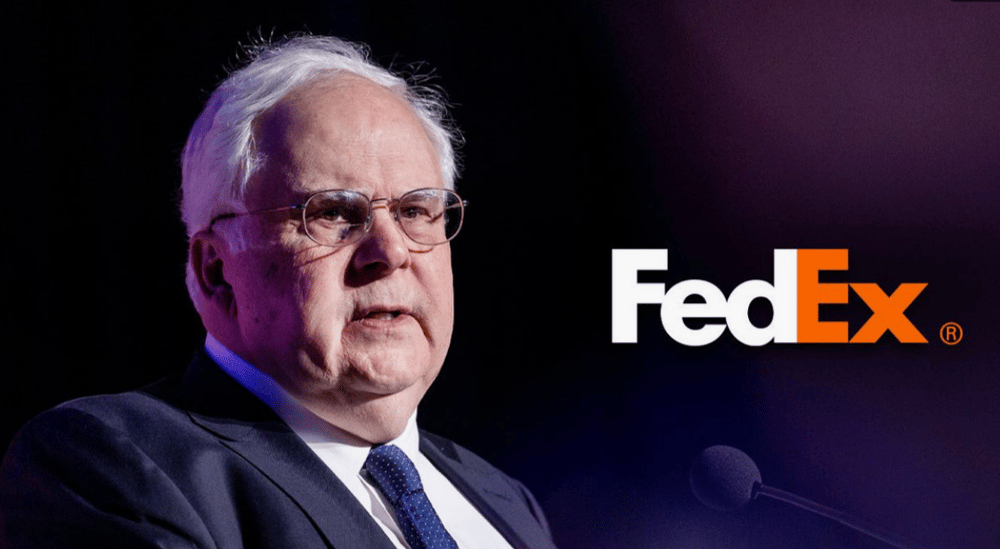FedEx Founder Frederick W. Smith Dies at 80: Global Logistics Icon Leaves Enduring Legacy
Frederick W. Smith, the founder and executive chairman of FedEx Corporation $FDX, has died at the age of 80. His passing marks the end of an era for the global logistics and transportation industry. Smith's bold vision, conceived during his time at Yale University, redefined international shipping and positioned FedEx as a cornerstone of global commerce. His death prompts both a reflection on the company's history and questions about its future trajectory in a rapidly evolving market landscape.
A Pioneering Legacy in Global Logistics
Smith's journey began with a simple yet revolutionary idea—an integrated air-to-ground system for overnight deliveries. Though initially dismissed by academia, this concept laid the groundwork for what would become one of the world’s most influential shipping and logistics companies.
FedEx was officially incorporated in 1971 and commenced operations in 1973. Under Smith's leadership, the company expanded into a multinational conglomerate with a presence in over 220 countries and territories. Its headquarters in Memphis, Tennessee, turned the city into a logistics hub, generating thousands of jobs and economic growth.
FedEx's innovation in real-time package tracking and hub-and-spoke delivery models set industry standards that competitors would later follow. Over five decades, Smith evolved from an ambitious entrepreneur into a transformative corporate leader, often described as the "father of modern logistics."

Key Facts About Frederick W. Smith and FedEx:
Born: August 11, 1944, in Marks, Mississippi
Founded FedEx: 1971; operations began in 1973
Education: Yale University (concept for FedEx originated during his time there)
Executive Roles: CEO until 2022; Executive Chairman until his death in 2025
FedEx’s Global Impact: Over 500,000 employees, $90+ billion in annual revenue
Contribution to Memphis: Made the city a global distribution center
Market Reactions and Strategic Outlook
Following the announcement of Smith’s death, FedEx shares experienced mild volatility in early trading, though the long-term impact on the stock remains uncertain. Market analysts point to the company’s robust succession planning and recent executive restructuring as factors likely to stabilize investor sentiment.
FedEx recently completed a strategic realignment under new CEO Raj Subramaniam, who assumed leadership in 2022. The company continues to navigate global supply chain disruptions, increased competition from Amazon $AMZN and UPS $UPS, and the ongoing digital transformation in logistics.
Industry stakeholders and corporate leaders offered tributes recognizing Smith’s contribution not only to FedEx but to global commerce at large. His ability to forecast digital-era shipping needs decades in advance is frequently cited as one of the most influential business insights of the 20th century.

Top 5 Strategic Takeaways:
Stable Succession: FedEx's leadership transition was well-structured, reducing long-term uncertainty.
Market Impact: Short-term stock fluctuations are possible, but no systemic risk expected.
Industry Standing: Smith's legacy reinforces FedEx’s brand strength in a competitive landscape.
Operational Resilience: The company’s logistics network remains one of the most advanced globally.
Civic Legacy: Smith’s investment in Memphis has created lasting social and economic benefits.
Conclusion: End of an Era, Beginning of a Legacy
Frederick W. Smith’s death represents more than the loss of a founder—it is the conclusion of a visionary chapter in the history of global logistics. His foresight, entrepreneurial resilience, and transformative leadership built FedEx into an indispensable infrastructure of global trade. While the company’s future now rests with a new generation of executives, Smith’s influence will remain embedded in its DNA and the very architecture of modern logistics.















Comments
Frederick Smith's legacy will undoubtedly continue to shape the logistics world for years to come.